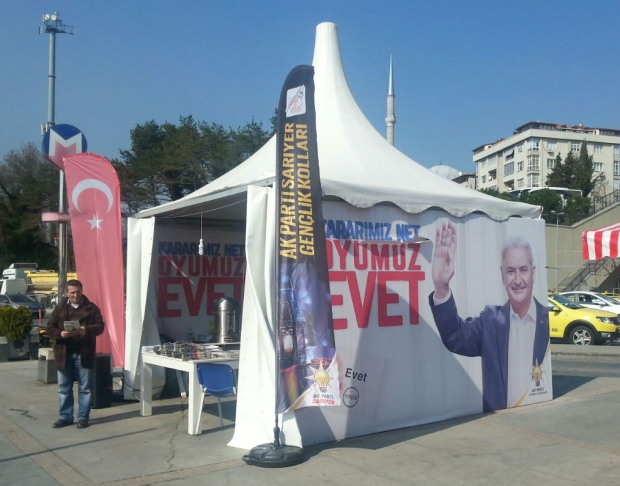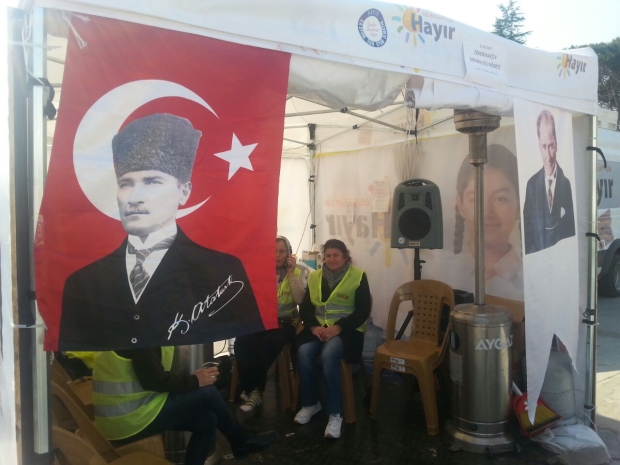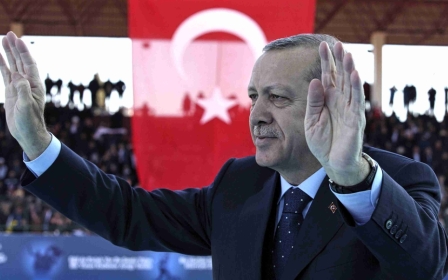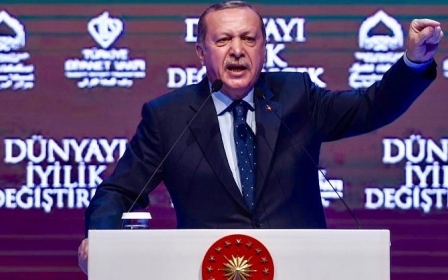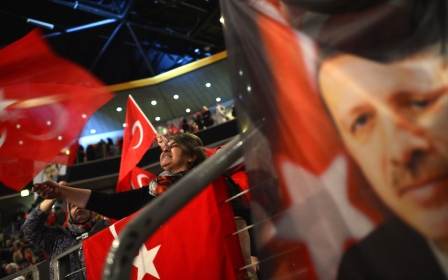Turkey decides: Despite rhetoric of hate, harmony prevails on the streets
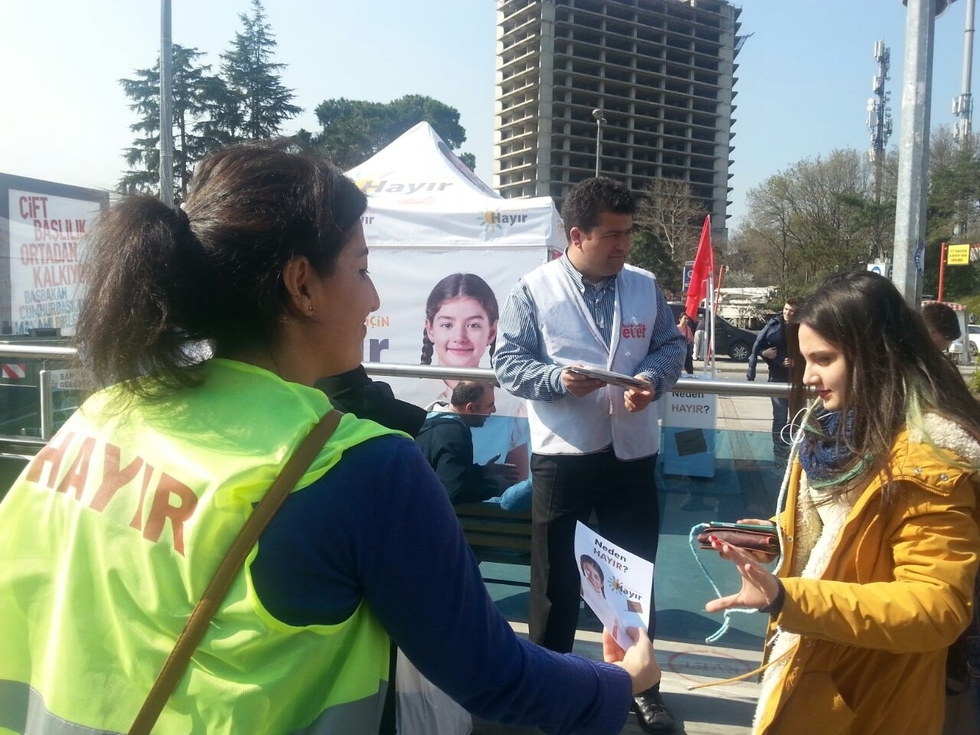
ISTANBUL, Turkey – Campaigning for Turkey’s upcoming referendum is now in full swing and the atmosphere resembles that of a local five-a-side match: lots of passion and competitiveness on display but with a sense of amicability – and a lot of bickering.
Volunteers in different-coloured bibs with either Yes or No printed on their backs stand next to each other at entrances to metro stations and other major public places and try to sway the public towards their point of view; they distribute booklets and invite people to their respective tents for tea and a chat amid loud campaign music. And all these actions are carried out with a smile on the volunteers’ faces.
At times in the evening it even feels like a day out with the whole family present - kids milling around, people chatting and distributing booklets in favour of their side, and families trying to make an evening out of it.
All this is in sharp contrast to the vitriolic hatred being spouted against the No camp by the government and ruling Justice and Development Party’s (AKP) top officials who have even repeatedly likened the No camp to “terrorists”.
Fearful of defeat in the referendum slated for 16 April – when constitutional amendments which would grant the president vast and largely unchecked powers will be put to the vote – the leaders of the AKP and its partners in the fractured Nationalist Movement Party (MHP) have used all means at their disposal to nullify the No camp.
Apart from vilifying the No camp as “terrorists” and “traitors”, some of these means have included reduced airtime on television, the cancellation of venue spaces, and power being cut off at venues, by a combination of state actors and local municipalities and private companies, amid claims of them being pressured into taking such measures.
AKP-run municipalities have blocked No supporters from campaigning in their districts, and are alleged to have defaced No campaign posters on billboards, while MHP leaders who have spoken out against the proposed changes have been physically assaulted.
For the volunteer campaigners at the Haciosman metro station in Istanbul, however, all that anger seems a world away.
Zikrullah Ozgun, a businessman, has volunteered his time to campaign for the Yes camp and spends a large chunk of his day wearing his white bib with Evet (Yes in Turkish) printed on the back. Standing right next to him outside the metro station are campaigners from the No camp.
‘There have been no problems. We speak to each other, have tea together’
“We have all been here together now for around 15 days. There have been no problems. We speak to each other, have tea together,” Ozgun told Middle East Eye.
“In this end we are all sane people so why should we argue? We are all the same nation. We are siblings.”
Aysegul Duveloglu, a retired civil servant, wears a bright green bib with Hayir (No in Turkish) printed on the back. She told MEE that despite the civility among the two opposing camps, the No camp was at times threatened and insulted by some passersby.
“We have had no problems with our Yes-voting neighbours thus far. But you can sense that some people are scared to come to our stand, fearing some sort of reprisal. This feeling has been there all along,” she said.
“But there are no problems between those of us who come here daily from both camps. We are volunteers who campaign for our own sides.”
The two camps have adopted contrasting strategies and that has become more visible as their grassroots take to the streets.
The Yes tent displays the AKP logo and, oddly, huge photos of Binali Yildirim, the prime minister, whose position will be abolished if the system is changed.
The No camp, on the other hand, only has photos of Mustafa Kemal Ataturk, modern Turkey’s founder, and a photo of a young girl, appearing to symbolise the future of the country.
Flying flower pots and music wars
However, with the crucial importance attached to the outcome of this referendum, which many believe could alter the direction of the country, even the volunteers campaigning harmoniously at Haciosman are not immune from taking swipes at each other and engaging in a different sort of confrontation.
“Look, our brochures explain each article in detail [18 amended articles are being voted on]. Our neighbours in the No camp speak by rote. They can’t even answer questions posed to them,” said Ozgun.
Duveloglu of the No camp retorts: “We are comprised solely of volunteers. But we learned that the Yes camp has paid university students to distribute brochures for them.”
“And we have more women in our team. They are mostly men. That is also very indicative of their mindset,” she said.
As far as open hostility goes between the two camps though, it is only through the volume of the music.
“Every time we start playing our campaign music, they turn the volume up on theirs to drown us out. But that is fine and we all have a laugh about it,” said Duveloglu.
What worries her is the behaviour of some commuters walking past who seem to have been influenced by the claims being made by the AKP’s top brass about the No side.
“Some of them take our booklets, tear them up and start insulting us and calling us all sorts of things like traitor, terrorist and foreign agent,” she said.
Elsewhere on Wednesday, loud campaigning was not tolerated as patiently as outside the metro station.
In the western port city of Izmir, an irate woman flung a flower pot from her balcony at an AKP campaign bus for blaring out loud campaign music and disturbing her ill mother.
Ayse Gul Gurcen, 53, threw the flower pot at a minibus carrying members of the AKP’s local women’s branch who were playing the tunes as part of their campaign activities, local media reported.
No injuries were reported but both sides have filed police charges against each other.
A relatively flat run-in looks likely to be livened up with campaigning entering its final stretch and a tight race predicted. People in Turkey will need to beware of flying flower pots and damage to the ear drums in the coming weeks.
New MEE newsletter: Jerusalem Dispatch
Sign up to get the latest insights and analysis on Israel-Palestine, alongside Turkey Unpacked and other MEE newsletters
Middle East Eye delivers independent and unrivalled coverage and analysis of the Middle East, North Africa and beyond. To learn more about republishing this content and the associated fees, please fill out this form. More about MEE can be found here.


